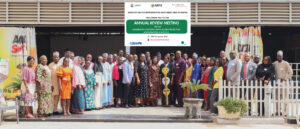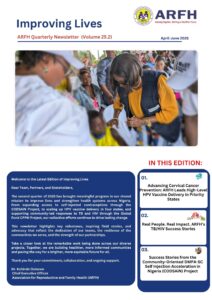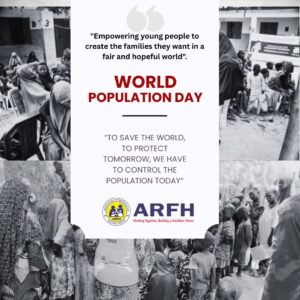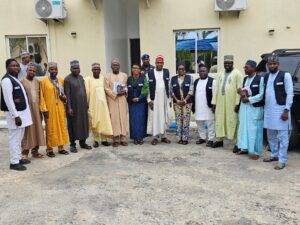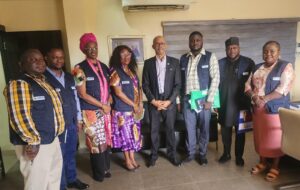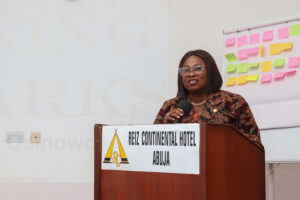
As part of the start-up of Year 2, Community Oriented DMPA-SC/SI implementation in the 8 projects BMGF supported states (Enugu, Gombe, Kano, Lagos, Nasarawa, Niger, Plateau, and Yobe states), the Association for Reproductive and Family Health (ARFH) organized a three-day annual review of previous year project implementation. The meeting provided a platform to address the challenges of the 1st year project implementation and chart the way forward for the second year. In addition, the meeting was an avenue for team members including state staff, representatives of community-based organizations (CBOs), and Ad-hoc staff from implementing states (Enugu, Gombe, Kano, Lagos, Nasarawa, Niger, Plateau, and Yobe states) to have a clear understanding of the project direction and guide the states in the second phase of project implementation.
Highlights of Daily Activities
Day 1:
Dr. Kehinde Osinowo, CEO of ARFH, delivered opening remarks, emphasizing the project’s objectives to improve family planning services’ acceptability and accessibility. Dr. Osinowo highlighted achievements and challenges, including occasional stock-outs of FP commodities, expressing commitment to collaboration for project success.
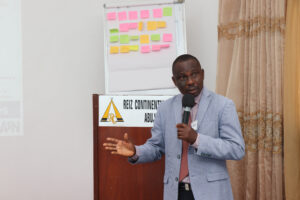 Dr. Uba Sabo, Program Manager CODSAiN project, presented an overview of the CODSAiN project, focusing on goals, strategies, implementation status, and key outcomes such as improved access to DMPA-SC self-injection. Stakeholders’ roles and responsibilities were outlined, emphasizing collaboration for project success.
Dr. Uba Sabo, Program Manager CODSAiN project, presented an overview of the CODSAiN project, focusing on goals, strategies, implementation status, and key outcomes such as improved access to DMPA-SC self-injection. Stakeholders’ roles and responsibilities were outlined, emphasizing collaboration for project success.
Dr. Binyerem C. Ukaire, the Head of Reproductive Health Division FMoH, from the Federal Ministry of Health discussed Nigeria’s FP status and response, emphasizing efforts to ensure equitable access to quality FP services through initiatives like the FP2030. Actionable steps were proposed, including sustained capacity-building efforts and advocacy for implementing national guidelines.
Sessions on progress towards outcomes, innovative practices, and challenges were conducted by the Monitoring Evaluation and Learning (MEL) team, with recommendations for future programming. Discussions also covered demand-generation activities, communication strategies for visibility, and accountability enhancement through social media engagement.
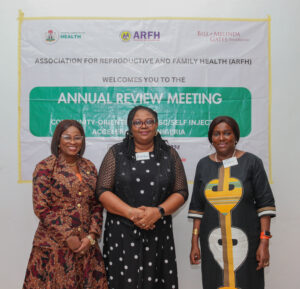 Rodio Dialo, Senior Program Officer from the Bill and Melinda Gates Foundation, expressed delight in partnering with ARFH and the Federal Ministry of Health to boost Family Planning uptake through DMPA-SC self-injection. Despite challenges, Rodio praised Nigeria’s innovative healthcare policies and highlighted the critical role of Family Planning in saving lives and promoting economic development. Commending ARFH’s dedication and collaboration with key stakeholders, Rodio expressed optimism for a brighter future for women and girls in Nigeria through collaborative efforts.
Rodio Dialo, Senior Program Officer from the Bill and Melinda Gates Foundation, expressed delight in partnering with ARFH and the Federal Ministry of Health to boost Family Planning uptake through DMPA-SC self-injection. Despite challenges, Rodio praised Nigeria’s innovative healthcare policies and highlighted the critical role of Family Planning in saving lives and promoting economic development. Commending ARFH’s dedication and collaboration with key stakeholders, Rodio expressed optimism for a brighter future for women and girls in Nigeria through collaborative efforts.
Day 2:
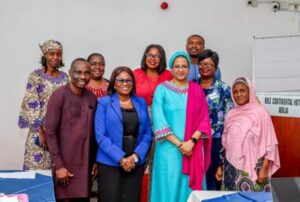 Family Planning Commodity Availability and Logistics was presented by Pharm Alex Ugochukwu from the Federal Ministry of Health presented on the “One Basket Fund System” established in 2011, pooling funds from various partners. The session emphasized efficient fund utilization, distribution using state-generated data, and the importance of addressing funding gaps and challenges in commodity distribution.
Family Planning Commodity Availability and Logistics was presented by Pharm Alex Ugochukwu from the Federal Ministry of Health presented on the “One Basket Fund System” established in 2011, pooling funds from various partners. The session emphasized efficient fund utilization, distribution using state-generated data, and the importance of addressing funding gaps and challenges in commodity distribution.
Improving Data Management and Accountability: Olajimi Latunji from John Snow Incorporated discussed capacity building for DMPA-SC and SI in Nigeria, focusing on enhancing Family Planning data quality, data entry, transmission, validation, and oversight. Recommendations included enhancing provider capacity, communicating SOPs for data validation, fostering linkages for harmonizing FP data, and incorporating data management into FP coordinators’ roles.
Feedback from the sessions highlighted the importance of collaboration, efficient fund utilization, addressing challenges in commodity distribution, and enhancing data quality to ensure the success of reproductive health programs. Recommendations included consistent government payment of counterpart funds, developing state-funded procurement guidelines, extending guidelines implementation to more states, and enhancing provider capacity for accurate data entry and management.
Review of Year 1 Performance data across states
- 56,830 women were mobilized in the community and provided with DMPA-SC services.
- 1,161 women were reached through integrated health outreaches.
- ARFH facilitated the distribution of 15,000 units of DMPA-SC from Ibadan to Gombe, providing crucial logistics assistance.
- A total of 186 state trainers were trained, along with 3860 providers from 1932 facilities and 421 CORPS members.
- Capacity Building on DMPA-SC/SI
- 4,427 facility service providers trained
- Training conducted across 128 clusters
- Coverage in 85 Local Government Areas (LGAs)
- Participants include 3,109 experienced individuals with prior FP service experience
- 1,318 participants with limited experience (CORPS)
- Service delivery on the project has witnessed a significant increase in client preferences for DMPA-SC and SI.
- Baseline figure: 1,838 DMPA-SC and SI before training.
- Subsequent increase to 258,677 clients by November 2023.
- 32% of the total clients (83,437) opted for self-injection.
Day 3:
Session focused on Project Evaluation and Learning, delving into the result framework, learning, and research questions from the project evaluation. Key highlights included performance result trackers for various outcomes, such as strengthening health systems for FP programming, boosting demand for integrated FP services, increasing access to DMPA-SC self-injection, ensuring high-quality data, and demonstrating government ownership and sustainability.
Participants emphasized the need to accurately report DMPA-SC/SI service delivery points and maintain zero stock-out of contraceptives to ensure uninterrupted access. These recommendations reflect a commitment to enhancing service delivery and sustaining project-supported activities for the CODSAiN project.
